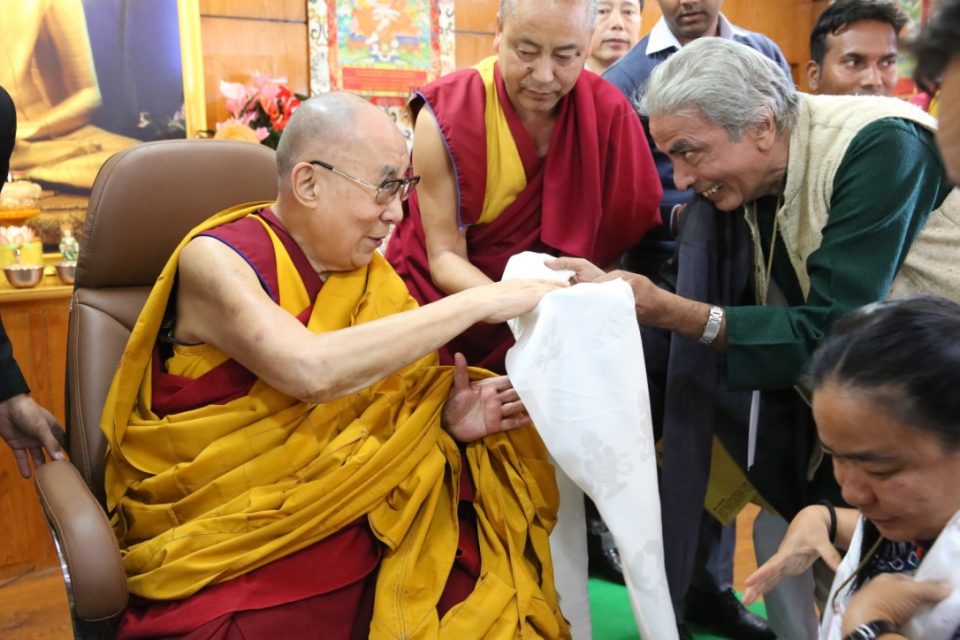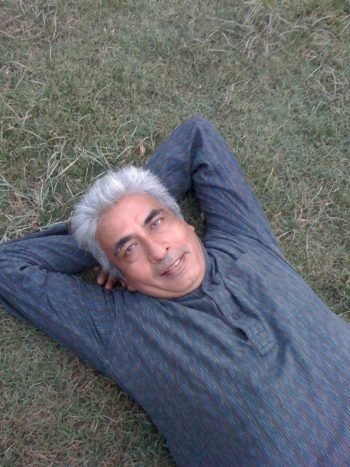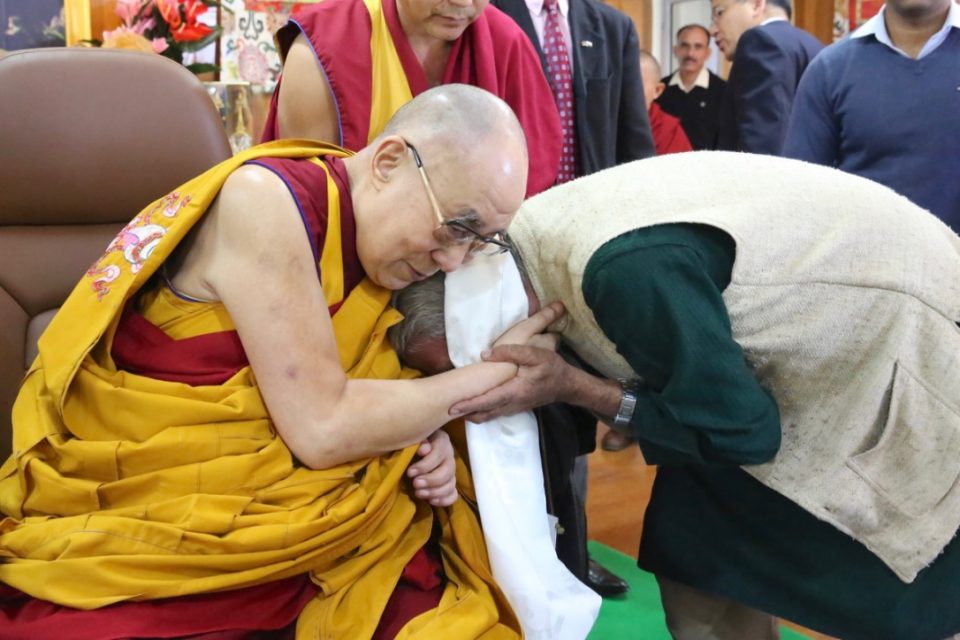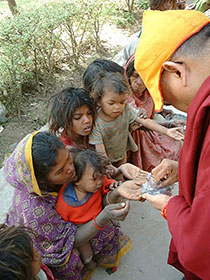- Home
- FPMT Homepage
Foundation for the Preservation of the Mahayana Tradition
The FPMT is an organization devoted to preserving and spreading Mahayana Buddhism worldwide by creating opportunities to listen, reflect, meditate, practice and actualize the unmistaken teachings of the Buddha and based on that experience spreading the Dharma to sentient beings. We provide integrated education through which people’s minds and hearts can be transformed into their highest potential for the benefit of others, inspired by an attitude of universal responsibility and service. We are committed to creating harmonious environments and helping all beings develop their full potential of infinite wisdom and compassion. Our organization is based on the Buddhist tradition of Lama Tsongkhapa of Tibet as taught to us by our founders Lama Thubten Yeshe and Lama Thubten Zopa Rinpoche.
- Willkommen
Die Stiftung zur Erhaltung der Mahayana Tradition (FPMT) ist eine Organisation, die sich weltweit für die Erhaltung und Verbreitung des Mahayana-Buddhismus einsetzt, indem sie Möglichkeiten schafft, den makellosen Lehren des Buddha zuzuhören, über sie zur reflektieren und zu meditieren und auf der Grundlage dieser Erfahrung das Dharma unter den Lebewesen zu verbreiten.
Wir bieten integrierte Schulungswege an, durch denen der Geist und das Herz der Menschen in ihr höchstes Potential verwandelt werden zum Wohl der anderen – inspiriert durch eine Haltung der universellen Verantwortung und dem Wunsch zu dienen. Wir haben uns verpflichtet, harmonische Umgebungen zu schaffen und allen Wesen zu helfen, ihr volles Potenzial unendlicher Weisheit und grenzenlosen Mitgefühls zu verwirklichen.
Unsere Organisation basiert auf der buddhistischen Tradition von Lama Tsongkhapa von Tibet, so wie sie uns von unseren Gründern Lama Thubten Yeshe und Lama Thubten Zopa Rinpoche gelehrt wird.
- Bienvenidos
La Fundación para la preservación de la tradición Mahayana (FPMT) es una organización que se dedica a preservar y difundir el budismo Mahayana en todo el mundo, creando oportunidades para escuchar, reflexionar, meditar, practicar y actualizar las enseñanzas inconfundibles de Buda y en base a esa experiencia difundir el Dharma a los seres.
Proporcionamos una educación integrada a través de la cual las mentes y los corazones de las personas se pueden transformar en su mayor potencial para el beneficio de los demás, inspirados por una actitud de responsabilidad y servicio universales. Estamos comprometidos a crear ambientes armoniosos y ayudar a todos los seres a desarrollar todo su potencial de infinita sabiduría y compasión.
Nuestra organización se basa en la tradición budista de Lama Tsongkhapa del Tíbet como nos lo enseñaron nuestros fundadores Lama Thubten Yeshe y Lama Zopa Rinpoche.
A continuación puede ver una lista de los centros y sus páginas web en su lengua preferida.
- Bienvenue
L’organisation de la FPMT a pour vocation la préservation et la diffusion du bouddhisme du mahayana dans le monde entier. Elle offre l’opportunité d’écouter, de réfléchir, de méditer, de pratiquer et de réaliser les enseignements excellents du Bouddha, pour ensuite transmettre le Dharma à tous les êtres. Nous proposons une formation intégrée grâce à laquelle le cœur et l’esprit de chacun peuvent accomplir leur potentiel le plus élevé pour le bien d’autrui, inspirés par le sens du service et une responsabilité universelle. Nous nous engageons à créer un environnement harmonieux et à aider tous les êtres à épanouir leur potentiel illimité de compassion et de sagesse. Notre organisation s’appuie sur la tradition guéloukpa de Lama Tsongkhapa du Tibet, telle qu’elle a été enseignée par nos fondateurs Lama Thoubtèn Yéshé et Lama Zopa Rinpoché.
Visitez le site de notre Editions Mahayana pour les traductions, conseils et nouvelles du Bureau international en français.
Voici une liste de centres et de leurs sites dans votre langue préférée
- Benvenuto
L’FPMT è un organizzazione il cui scopo è preservare e diffondere il Buddhismo Mahayana nel mondo, creando occasioni di ascolto, riflessione, meditazione e pratica dei perfetti insegnamenti del Buddha, al fine di attualizzare e diffondere il Dharma fra tutti gli esseri senzienti.
Offriamo un’educazione integrata, che può trasformare la mente e i cuori delle persone nel loro massimo potenziale, per il beneficio di tutti gli esseri, ispirati da un’attitudine di responsabilità universale e di servizio.
Il nostro obiettivo è quello di creare contesti armoniosi e aiutare tutti gli esseri a sviluppare in modo completo le proprie potenzialità di infinita saggezza e compassione.
La nostra organizzazione si basa sulla tradizione buddhista di Lama Tsongkhapa del Tibet, così come ci è stata insegnata dai nostri fondatori Lama Thubten Yeshe e Lama Zopa Rinpoche.
Di seguito potete trovare un elenco dei centri e dei loro siti nella lingua da voi prescelta.
- 欢迎 / 歡迎
简体中文
“护持大乘法脉基金会”( 英文简称:FPMT。全名:Foundation for the Preservation of the Mahayana Tradition) 是一个致力于护持和弘扬大乘佛法的国际佛教组织。我们提供听闻,思维,禅修,修行和实证佛陀无误教法的机会,以便让一切众生都能够享受佛法的指引和滋润。
我们全力创造和谐融洽的环境, 为人们提供解行并重的完整佛法教育,以便启发内在的环宇悲心及责任心,并开发内心所蕴藏的巨大潜能 — 无限的智慧与悲心 — 以便利益和服务一切有情。
FPMT的创办人是图腾耶喜喇嘛和喇嘛梭巴仁波切。我们所修习的是由两位上师所教导的,西藏喀巴大师的佛法传承。
繁體中文
護持大乘法脈基金會”( 英文簡稱:FPMT。全名:Found
ation for the Preservation of the Mahayana Tradition ) 是一個致力於護持和弘揚大乘佛法的國際佛教組織。我們提供聽聞, 思維,禪修,修行和實證佛陀無誤教法的機會,以便讓一切眾生都能 夠享受佛法的指引和滋潤。 我們全力創造和諧融洽的環境,
為人們提供解行並重的完整佛法教育,以便啟發內在的環宇悲心及責 任心,並開發內心所蘊藏的巨大潛能 — 無限的智慧與悲心 – – 以便利益和服務一切有情。 FPMT的創辦人是圖騰耶喜喇嘛和喇嘛梭巴仁波切。
我們所修習的是由兩位上師所教導的,西藏喀巴大師的佛法傳承。 察看道场信息:
- FPMT Homepage
- News/Media
-
- Study & Practice
-
-
- About FPMT Education Services
- Latest News
- Programs
- New to Buddhism?
- Buddhist Mind Science: Activating Your Potential
- Heart Advice for Death and Dying
- Discovering Buddhism
- Living in the Path
- Exploring Buddhism
- FPMT Basic Program
- FPMT Masters Program
- FPMT In-Depth Meditation Training
- Maitripa College
- Lotsawa Rinchen Zangpo Translator Program
- Universal Education for Compassion & Wisdom
- Online Learning Center
-
- Prayers & Practice Materials
- Overview of Prayers & Practices
- Full Catalogue of Prayers & Practice Materials
- Explore Popular Topics
- Benefiting Animals
- Chenrezig Resources
- Death & Dying Resources
- Lama Chopa (Guru Puja)
- Lama Zopa Rinpoche: Compendium of Precious Instructions
- Lama Zopa Rinpoche: Life Practice Advice
- Lama Zopa Rinpoche Practice Series
- Lamrim Resources
- Mantras
- Prayer Book Updates
- Purification Practices
- Sutras
- Thought Transformation (Lojong)
- Audio Materials
- Dharma Dates - Tibetan Calendar
- Translation Services
- Publishing Services
- Ways to Offer Support
- Prayers & Practice Materials
-
- Teachings and Advice
- Find Teachings and Advice
- Lama Zopa Rinpoche Advice Page
- Lama Zopa Rinpoche: Compendium of Precious Instructions
- Lama Zopa Rinpoche Video Teachings
- ༧སྐྱབས་རྗེ་བཟོད་པ་རིན་པོ་ཆེ་མཆོག་ནས་སྩལ་བའི་བཀའ་སློབ་བརྙན་འཕྲིན།
- Podcasts
- Lama Yeshe Wisdom Archive
- Buddhism FAQ
- Dharma for Young People
- Resources on Holy Objects
- Teachings and Advice
-
-
*If a menu item has a submenu clicking once will expand the menu clicking twice will open the page.
-
-
- Centers
-
- Teachers
-
- Projects
-
-
-
-
*If a menu item has a submenu clicking once will expand the menu clicking twice will open the page.
-
-
- FPMT
-
- Shop
-
-
-
The Foundation Store is FPMT’s online shop and features a vast selection of Buddhist study and practice materials written or recommended by our lineage gurus. These items include homestudy programs, prayers and practices in PDF or eBook format, materials for children, and other resources to support practitioners.
Items displayed in the shop are made available for Dharma practice and educational purposes, and never for the purpose of profiting from their sale. Please read FPMT Foundation Store Policy Regarding Dharma Items for more information.
-
-
28

His Holiness the Dalai Lama with Naresh Mathur. Photo courtesy of the Office of His Holiness the Dalai Lama.
We are saddened to share the news that Naresh Sahai Mathur passed away at the age of 67, in New Delhi, India, on April 25, 2021, of COVID-19. Naresh was an early student of FPMT founders Lama Thubten Yeshe and Lama Zopa Rinpoche, and a long-time FPMT volunteer. Kabir Saxena, also a long-time FPMT student who currently serves as the spiritual program coordinator at Tushita Mahayana Meditation Centre in New Delhi, wrote a personal remembrance of Naresh to share with the international FPMT community.
By Kabir Saxena
With the recent untimely passing away of Naresh Mathur—another victim of the second murderous wave of COVID-19—the Indian Buddhist sangha, his friends worldwide, as well as the Tibetan community, have lost an invaluable supporter, legal advisor, and much beloved friend.
Naresh was born in Old Delhi in 1954, close to where some twenty-five years later the pioneers of Tushita Mahayana Meditation Centre would be living. It’s a testimony to his great intellectual and spiritual thirst that he was willing and able to seek beyond his quality education in sociology and law at two of Delhi’s esteemed establishments and find himself at the doors of both Tushita Mahayana Meditation Centre and Tibet House in Delhi.
While the practice of law provided his bread and butter, it was Buddhist studies that quickly established their prominence in Naresh’s heart and mind. Early on he had the great good fortune to receive personal, one-on-one teachings on lamrim and Madhyamaka from the renowned Geshe Palden Drakpa, who became a lifelong friend of the family and a recipient of Naresh’s generous medical help. It was, I believe, this deep experience of the teachings with Geshe-la that made Naresh a lifelong proponent of the sublime Nalanda parampara (tradition), with its emphasis on the guru-disciple relationship, logical inquiry, and debate. It was to these teachings that Naresh returned again and again; even in the last decade of his life, he was an important part of the core group of students at Geshe Dorji Damdul’s Tibet House Nalanda Masters Course.
Naresh was a lover of knowledge, a philosopher in the true sense of the word, and all his life he combined that with his work as a lawyer in the High and Supreme Courts in Delhi.

Naresh Mathur
When I first met him in 1980, he was a bright and extremely handsome young man, much impressed by his contact with Lama Thubten Yeshe and Lama Zopa Rinpoche. Naresh went on to be a director of Tushita Mahayana Meditation Centre, an organizer of the Dharma Celebrations with His Holiness the Dalai Lama in Delhi, and the creator of Root Institute for Wisdom Culture’s Trust Deed in 1984 in Bodhgaya. He remained a trustee until a few months before his death.
His dedication to the cause of bringing the Dharma back to Indian people was profound and lasting. He participated in the teachings His Holiness gave to small groups of Indian students in the early 1980s and despite his heavy workload would, almost thirty years later, travel to Bodhgaya for the weekends to give teachings in Hindi to local students.
Naresh unstintingly helped the Tibetan cause with his legal talents and the list of his efforts on their behalf would be too long to include here. As an example, it was largely due to his legal actions that the Tibetan Colony of Majnu Ka Tila in Delhi was saved from destruction. Tenzin Geyche Tethong, former secretary to His Holiness, recalled how he had known Naresh since 1980 and how he greatly admired his interest in and knowledge of Buddhism, and also appreciated Naresh’s contribution to the Dalai Lama Trust of which he was a trustee.
In addition to his connection with Lama Yeshe, Lama Zopa Rinpoche, and FPMT, Naresh had a close connection with Dzongsar Jamyang Khyentse Rinpoche and his Deer Park Institute in Bir, as well as with Samdhong Rinpoche, whose Gandhian vision, critique of modernity, and Dharma advice were like nectar for Naresh.
Naresh was a lover of the meditative dhrupad style of Indian classical music, and we also spent many happy moments listening to Bob Dylan together. He could also be quite mischievous, and we would especially enjoy making silent and secret fun of speakers at conferences whom we considered not up to the mark.
He was a practitioner, especially of the Madhyamaka and the Kalachakra, and was increasingly drawn to extended practice in the last year of his life, according to his wife, Antonella. Throughout his life he had inspired and encouraged a younger generation of students by his example.
For me, and I am sure for many others, including his dear circle of Italian and international friends, Naresh was like family. His deep soulful eyes were those of the eternal seeker and lover; they grabbed you. My father, to whom Naresh was very loving and generous, used to say that going by Naresh’s piercing gaze, he was always in a state of otherworldly intoxication!
In his last year, during long walks together in the woods near his home in south Delhi, Naresh would always steer the conversation to the Dharma, the importance of a grounding in lamrim, and his great love and obsession: the presentation of emptiness in the Gelug tradition. Despite his allegiance to many lamas of different schools of Tibetan Buddhism, he always seemed to be happily and no doubt karmically tethered to the pole of Lama Tsongkhapa’s works and Geshe Palden Dragpa’s teachings.

His Holiness the Dalai Lama with Naresh Mathur. Photo courtesy of the Office of His Holiness the Dalai Lama.
After his passing, His Holiness the Dalai Lama made the encouraging pronouncement that Naresh was his disciple, that we should not worry, and that he would take a good rebirth and would remember this life of his. The passing of this kind-hearted and generous man, still somewhat unreal and unbelievable to some of us, leaves a big void in many lives. Naresh is survived by his wife, Antonella, a gifted healer; daughter, Mudita, a talented graphic designer; and son, Atisha, a profound, upcoming teacher of the Dharma, especially of Buddhist logic, the subject matter his dear departed father so admired and communicated so readily to those fortunate enough to cross his path.
The FPMT India community organized a moving online prayer meeting and memorial for Naresh Mathur on May 5, 2021, with Naresh’s family and many long-time students around the world joining in. You can watch the two-hour recording of the Zoom call:
https://www.facebook.com/1652241455007411/videos/457118005515720/?__so__=channel_tab&__rv__=all_videos_card
For more on practices recommended by Lama Zopa Rinpoche at time of death and other resources to support yourself and loved ones at time of death, please visit fpmt.org/death/.
FPMT.org and Mandala Publications brings you news of Lama Zopa Rinpoche and of activities, teachings, and events from over 160 FPMT centers, projects, and services around the globe. If you like what you read, consider becoming a Friend of FPMT, which supports our work.
- Tagged: kabir saxena, naresh mathur, obituaries, ven. kabir saxena
- Home
- News/Media
- Study & Practice
- About FPMT Education Services
- Latest News
- Programs
- New to Buddhism?
- Buddhist Mind Science: Activating Your Potential
- Heart Advice for Death and Dying
- Discovering Buddhism
- Living in the Path
- Exploring Buddhism
- FPMT Basic Program
- FPMT Masters Program
- FPMT In-Depth Meditation Training
- Maitripa College
- Lotsawa Rinchen Zangpo Translator Program
- Universal Education for Compassion & Wisdom
- Online Learning Center
- Prayers & Practice Materials
- Overview of Prayers & Practices
- Full Catalogue of Prayers & Practice Materials
- Explore Popular Topics
- Benefiting Animals
- Chenrezig Resources
- Death & Dying Resources
- Lama Chopa (Guru Puja)
- Lama Zopa Rinpoche: Compendium of Precious Instructions
- Lama Zopa Rinpoche: Life Practice Advice
- Lama Zopa Rinpoche Practice Series
- Lamrim Resources
- Mantras
- Prayer Book Updates
- Purification Practices
- Sutras
- Thought Transformation (Lojong)
- Audio Materials
- Dharma Dates – Tibetan Calendar
- Translation Services
- Publishing Services
- Teachings and Advice
- Find Teachings and Advice
- Lama Zopa Rinpoche Advice Page
- Lama Zopa Rinpoche: Compendium of Precious Instructions
- Lama Zopa Rinpoche Video Teachings
- ༧སྐྱབས་རྗེ་བཟོད་པ་རིན་པོ་ཆེ་མཆོག་ནས་སྩལ་བའི་བཀའ་སློབ་བརྙན་འཕྲིན།
- Podcasts
- Lama Yeshe Wisdom Archive
- Buddhism FAQ
- Dharma for Young People
- Resources on Holy Objects
- Ways to Offer Support
- Centers
- Affiliates Area
- Teachers
- Projects
- Charitable Projects
- Make a Donation
- Applying for Grants
- News about Projects
- Other Projects within FPMT
- Support International Office
- Projects Photo Galleries
- Give Where Most Needed
- FPMT
- Shop
Translate*
*powered by Google TranslateTranslation of pages on fpmt.org is performed by Google Translate, a third party service which FPMT has no control over. The service provides automated computer translations that are only an approximation of the websites' original content. The translations should not be considered exact and only used as a rough guide.Happiness and suffering come from your own mind, not from outside. Your own mind is the cause of happiness; your own mind is the cause of suffering. To obtain happiness and pacify suffering, you have to work within your own mind.








